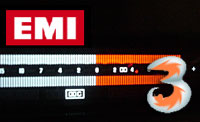 3G network operators 3 have announced a partnership with EMI Music UK to supply full-length music videos directly to the company’s 3 million customers.
3G network operators 3 have announced a partnership with EMI Music UK to supply full-length music videos directly to the company’s 3 million customers.
The deal will let music fans delve into EMI’s extensive back catalogue of music videos as well as download new releases from big sellers like Kylie Minogue, Coldplay, Jamelia, Joss Stone, Norah Jones and Gorillaz.
Material from all of EMIs other labels – including Parlophone, Relentless and Virgin – will also be made available.
 The tie-up with EMI means that 3 subscribers can access a veritable cornucopia of audio/visual delights on their phones, with the new video material adding to the wireless operator’s bulging music catalogue, which includes full-length video and audio titles from Sony BMG and indie music videos supplied by VidZone.
The tie-up with EMI means that 3 subscribers can access a veritable cornucopia of audio/visual delights on their phones, with the new video material adding to the wireless operator’s bulging music catalogue, which includes full-length video and audio titles from Sony BMG and indie music videos supplied by VidZone.
3 has proved a trail-blazer in the UK for music video on mobile, being the first mobile network to launch full-length music videos over mobile over a year ago and world-premiering a Robbie Williams’ single on their network.
The service has proved a hit too, with over 10 million full-length music videos being downloaded in the 6 months following the launch of 3’s Video Jukebox in August 2004.
Graeme Oxby, Marketing Director 3 UK, was chuffed: “3’s mobile music service is growing every day. Music is one of our most popular services and with this deal our customers can enjoy the latest music videos from top artists like Kylie, Robbie and Coldplay. 3’s expertise in 3G means major record labels like EMI Music UK recognise the strength of a partnership with the UK’s leading video mobile company.”
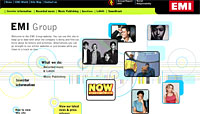 Next up on the back-slap promenade was Dave Gould, Commercial Manager, Digital Media for EMI Music UK: “We’re delighted to bring videos from EMI Music UK’s labels to 3. 3 is a leading network in bringing mobile music to its customers and we’re really excited about working with them to allow fans to catch up with their favourite artists anywhere and at anytime.”
Next up on the back-slap promenade was Dave Gould, Commercial Manager, Digital Media for EMI Music UK: “We’re delighted to bring videos from EMI Music UK’s labels to 3. 3 is a leading network in bringing mobile music to its customers and we’re really excited about working with them to allow fans to catch up with their favourite artists anywhere and at anytime.”
Wrapping up the music industry love-in, Peter Jamieson, chairman of UK record companies trade association the BPI, purred: “The UK recording industry is committed to making music available wherever and whenever the music fan wants it. We welcome the increasing range of repertoire now available on 3.”
 Handy… Literally!
Handy… Literally! Sounds nasty!
Sounds nasty! That lot again
That lot again Aussie God squadders looking to get down with Da Yoot have translated all 31,173 verses of the Bible into SMS text-speak.
Aussie God squadders looking to get down with Da Yoot have translated all 31,173 verses of the Bible into SMS text-speak.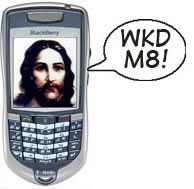 The translations were based on the Contemporary English Version and remained faithful to the grammar, with just the spellings being altered.
The translations were based on the Contemporary English Version and remained faithful to the grammar, with just the spellings being altered.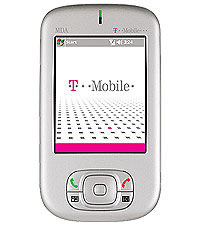 T-Mobile have launched ‘Web’n’walk’, their mass-market mobile Internet service, and are confidently predicting that it expects to lure hundreds of thousands of customers onto the service over the next couple of years.
T-Mobile have launched ‘Web’n’walk’, their mass-market mobile Internet service, and are confidently predicting that it expects to lure hundreds of thousands of customers onto the service over the next couple of years. Conceding that Internet services on mobile devices to date had so far been, well, rubbish, McBride bigged up T-Mobile’s approach for fast, simple and affordable services and products, saying that mobile networks will eventually carry more Internet traffic than fixed-line computers or phones.
Conceding that Internet services on mobile devices to date had so far been, well, rubbish, McBride bigged up T-Mobile’s approach for fast, simple and affordable services and products, saying that mobile networks will eventually carry more Internet traffic than fixed-line computers or phones. Japan’s largest annual IT show, Ceatec (Combined Exhibition of Advanced Technologies), opens today and will feature around 700 companies, according to the organisers.
Japan’s largest annual IT show, Ceatec (Combined Exhibition of Advanced Technologies), opens today and will feature around 700 companies, according to the organisers. Toshiba has promised to display a super-slim 12.7 millimetre high drive designed for laptops which can read HD-DVD discs and read and write DVDs and CDs.
Toshiba has promised to display a super-slim 12.7 millimetre high drive designed for laptops which can read HD-DVD discs and read and write DVDs and CDs. We saw it with the Internet in the late 90s and iTV in the early noughties, now mobile TV is the disruptive technology du jour.
We saw it with the Internet in the late 90s and iTV in the early noughties, now mobile TV is the disruptive technology du jour.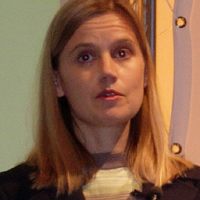 It’s easy to be swept up in the hype, and persuasive arguments abound.
It’s easy to be swept up in the hype, and persuasive arguments abound. Claire Tavernier from Fremantlemedia (right), owner of Neighbours and Baywatch, said “Fremantle TV” would launch on US mobile networks before the end of the year.
Claire Tavernier from Fremantlemedia (right), owner of Neighbours and Baywatch, said “Fremantle TV” would launch on US mobile networks before the end of the year. But is the industry is in danger of death by over-sell before it’s even arrived?
But is the industry is in danger of death by over-sell before it’s even arrived? This is all sounding very familiar – we’ve been here before. As with the early days of the Internet and iTV, business models are unclear. Hurdles include lack of appropriate content – including rights clearance on existing properties, lack of spectrum and unproven consumer demand.
This is all sounding very familiar – we’ve been here before. As with the early days of the Internet and iTV, business models are unclear. Hurdles include lack of appropriate content – including rights clearance on existing properties, lack of spectrum and unproven consumer demand.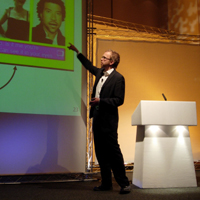 Tavernier also talked about rights, revealing that although Fremantlemedia owned worldwide TV rights to Mr Bean and The Benny Hill Show, both Rowan Atkinson and Benny Hill’s widow had said no to mobile distribution.
Tavernier also talked about rights, revealing that although Fremantlemedia owned worldwide TV rights to Mr Bean and The Benny Hill Show, both Rowan Atkinson and Benny Hill’s widow had said no to mobile distribution.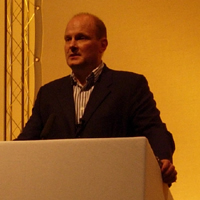 The most telling figures came in the final session of the conference: “Viewers don’t see their mobile as an entertainment device” said Enpocket’s Jeremy Wright (right). “They see it first and foremost as a communicator.”
The most telling figures came in the final session of the conference: “Viewers don’t see their mobile as an entertainment device” said Enpocket’s Jeremy Wright (right). “They see it first and foremost as a communicator.” Happy Birthday!
Happy Birthday! I found a screenshot of what Google used to look like on the Internet archive, and although it does obviously look a little old-school, it’s still much the same interface-wise as it is today:
I found a screenshot of what Google used to look like on the Internet archive, and although it does obviously look a little old-school, it’s still much the same interface-wise as it is today: It’s in Space, it’s got to be cool. Oh, actually, no nukes, so forget it
It’s in Space, it’s got to be cool. Oh, actually, no nukes, so forget it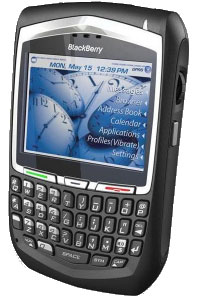 “Batman’s Blackberry”, but I still want one!
“Batman’s Blackberry”, but I still want one!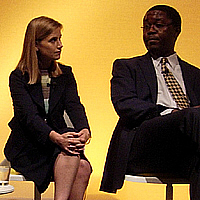 Hyacinth Nwana, (pictured left) speaking for Arqiva, and Jeremy Wright of Enpocket, both saw advertiser funded content – whether programming or entertaining video ‘spots’ – to be the key driver.
Hyacinth Nwana, (pictured left) speaking for Arqiva, and Jeremy Wright of Enpocket, both saw advertiser funded content – whether programming or entertaining video ‘spots’ – to be the key driver. The UK production and development community is in danger of losing out to competition from overseas if it doesn’t wake up to the potential of mobile TV, said Mark Selby, Nokia’s Global Vice President for Multimedia, (pictured right) at the inaugural Mobile TV forum in London today.
The UK production and development community is in danger of losing out to competition from overseas if it doesn’t wake up to the potential of mobile TV, said Mark Selby, Nokia’s Global Vice President for Multimedia, (pictured right) at the inaugural Mobile TV forum in London today.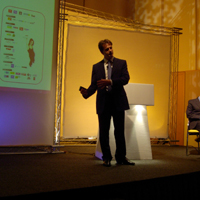 But many claimed that the lack of spectrum is holding DVB-H back in the UK.
But many claimed that the lack of spectrum is holding DVB-H back in the UK.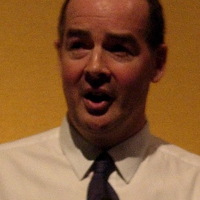 Digital One owns the UK’s only nationwide commercial DAB multiplex – but the capacity allocated for DMB is minimal.
Digital One owns the UK’s only nationwide commercial DAB multiplex – but the capacity allocated for DMB is minimal. Motorola have offered more details about their forthcoming 3G RAZR V3x slim flip phone.
Motorola have offered more details about their forthcoming 3G RAZR V3x slim flip phone. The onboard Bluetooth chip supports wireless stereo sound through Motorola’s Bluetooth Stereo headphones and other compatible hands free wotsits, with up to 512 MB of removable optional TransFlash memory.
The onboard Bluetooth chip supports wireless stereo sound through Motorola’s Bluetooth Stereo headphones and other compatible hands free wotsits, with up to 512 MB of removable optional TransFlash memory.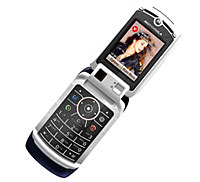 Motorola have also included an advanced speaker-independent voice recognition which lets users state a number/name and be connected without all that pre-recording palaver.
Motorola have also included an advanced speaker-independent voice recognition which lets users state a number/name and be connected without all that pre-recording palaver.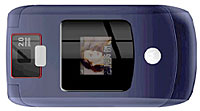 Meanwhile, as Motorola’s phones scoff the pies, rival NEC has launched the
Meanwhile, as Motorola’s phones scoff the pies, rival NEC has launched the